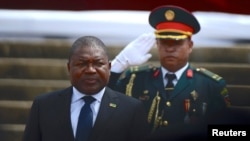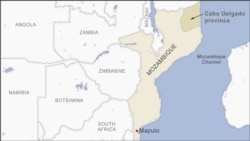Residents in two districts in northern Mozambique are still reeling from violent attacks carried out by Islamist militants last week.
Mocimboa da Praia and Quissanga, two small towns in the province of Cabo Delgado, were assaulted and besieged by militants reportedly affiliated with the Islamic State (IS) terror group.
The militants briefly took control of government buildings within 48 hours and raised their flag in both towns before retreating, local sources said.
“Many people saw what they had never expected to see,” said Rassul Daude, a resident of Quissanga. “The whole village was run by al-Shabab.”
Several radical militant groups have been active in Cabo Delgado in recent years, including Ansar al-Sunna, which has been responsible for terror attacks against civilians and government forces in northern Mozambique.
The group is known locally as al-Shabab, and it also goes by Ahlu al-Sunna and Swahili Sunna. Last week’s attacks were claimed by IS through its Amaq news agency.
Since 2017, militants affiliated with the group have carried out attacks in the Muslim-majority gas-rich region.
In April 2019, IS declared its so-called Central African Province, known as ISCAP. Attacks attributed to its Central African Province affiliate have been limited to Mozambique and the Democratic Republic of the Congo.
Fleeing residents
The recent attacks in Cabo Delgado has forced thousands of civilians to flee their homes, leaving behind their livestock and fisheries.
“Life here is not the same anymore,” said a local journalist, who demanded anonymity for fear of retribution from militants.
“Many residents understood their vulnerability and therefore left their villages. Others who had nowhere to go have remained, but they feel very unsafe,” he told VOA.
Another resident from Mocimboa de Praia described widespread looting caused by the extremists when they rampaged his hometown.
“The only public infrastructure that remained intact are the school and the hospital in Mocímboa da Praia,” he said, adding that as a result, a wave of displacement occurred among the local population.
According to the U.N., the violence in Cabo Delgado has displaced more than 100,000 people throughout the province.
Fear, captivity and uncertainty
Luis Fernando Lisboa, the Catholic bishop of Pemba, the provincial capital of Cabo Delgado, said the attacks have left residents in constant fear.
“Many of them sleep in the bushes. They leave their houses as the sun sets down and move to the bushes to sleep. They feel safe there,” he told VOA.
When attacking villages in Cabo Delgado, militants reportedly set the houses of residents on fire and damage their properties.
“In this region, the population is already impoverished, and they just lost the little they had – their houses were burnt,” Lisboa said.
For many displaced people, the future holds little hope for them return to their houses anytime soon.
Supaque Abdala told VOA that his house in Quissanga was burned down by the insurgents. He now lives in Pemba.
Abdala says he is certain that he will not return to his village because “he doesn’t want to go through the same thing again.”
Other displaced residents describe the horrors they experienced when militants attacked their villages.
Badrune Assane, a resident of Quissanga, says he was detained by the insurgents during the onslaught. But Assane said he managed to escape along with his wife and daughter the same night he was arrested.
He added that despite leaving Quissanga, the insurgents still control small nearby villages and “say they will not leave [as long as] state military forces aren’t present.”
Weak government response
While Mozambican authorities insist the security situation in northern Mozambique remains under control, observers believe that government armed forces have failed to provide adequate security.
“If it is under control, then how come more people are getting killed?” Bishop Lisboa asked.
“People here are not happy with the government response,” he added. “When it all started, the government took a long time to even issue a statement. We hardly hear them saying anything about the situation on Cabo Delgado.”
Eric Morier-Genoud, a Mozambique expert at Queen's University Belfast, says recent attacks show how tactical Islamist militants have been to win support from local communities in Cabo Delgado, noting that they have been growing steadily in the last year.
“The insurgents are clearly benefiting from the army’s weaknesses and problems,” he told VOA.
“What is interesting is that they [extremists] did not choose to expand but instead to intensify their fight by taking it to the towns,” he added.
Coronavirus fears
This week, Mozambique President Filipe Nyusi declared a state of emergency to tackle the coronavirus outbreak. The country’s Ministry of Health says there have been 10 confirmed cases.
And there are fears the deadly virus could spread quickly among those recently displaced in Cabo Delgado.
“These people face the risk of COVID-19. They have come in large groups to Pemba and cannot be in social isolation,” Lisboa said.
“It’s a dire situation, and we look anticipate [a response] from the government,” he added.












